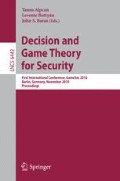Abstract
Attack–defense trees are used to describe security weaknesses of a system and possible countermeasures. In this paper, the connection between attack–defense trees and game theory is made explicit. We show that attack–defense trees and binary zero-sum two-player extensive form games have equivalent expressive power when considering satisfiability, in the sense that they can be converted into each other while preserving their outcome and their internal structure.
Access this chapter
Tax calculation will be finalised at checkout
Purchases are for personal use only
Preview
Unable to display preview. Download preview PDF.
References
Schneier, B.: Secrets and lies. Wiley, Indianapolis (2004)
Mauw, S., Oostdijk, M.: Foundations of Attack Trees. In: Won, D.H., Kim, S. (eds.) ICISC 2005. LNCS, vol. 3935, pp. 186–198. Springer, Heidelberg (2005)
Willemson, J., Jürgenson, A.: Serial Model for Attack Tree Computations. In: Lee, D., Hong, S. (eds.) ICISC 2009. LNCS, vol. 5984, pp. 118–128. Springer, Heidelberg (2010)
Rehák, M., Staab, E., Fusenig, V., Pěchouček, M., Grill, M., Stiborek, J., Bartoš, K., Engel, T.: Runtime Monitoring and Dynamic Reconfiguration for Intrusion Detection Systems. In: Kirda, E., Jha, S., Balzarotti, D. (eds.) RAID 2009. LNCS, vol. 5758, pp. 61–80. Springer, Heidelberg (2009)
Amenaza: SecurITree, http://www.amenaza.com/
Isograph: AttackTree+, http://www.isograph-software.com/atpover.htm
Edge, K.S., Dalton II, G.C., Raines, R.A., Mills, R.F.: Using Attack and Protection Trees to Analyze Threats and Defenses to Homeland Security. In: MILCOM, pp. 1–7. IEEE, Los Alamitos (2006)
Bistarelli, S., Dall’Aglio, M., Peretti, P.: Strategic Games on Defense Trees. In: Dimitrakos, T., Martinelli, F., Ryan, P.Y.A., Schneider, S. (eds.) FAST 2006. LNCS, vol. 4691, pp. 1–15. Springer, Heidelberg (2006)
Kordy, B., Mauw, S., Radomirović, S., Schweitzer, P.: Foundations of Attack–Defense Trees. In: FAST. LNCS. Springer, Heidelberg (2010), http://satoss.uni.lu/members/barbara/papers/adt.pdf
Kordy, B., Mauw, S., Melissen, M., Schweitzer, P.: Attack–defense trees and two-player binary zero-sum extensive form games are equivalent – technical report with proofs, http://arxiv.org/abs/1006.2732
Author information
Authors and Affiliations
Editor information
Editors and Affiliations
Rights and permissions
Copyright information
© 2010 Springer-Verlag Berlin Heidelberg
About this paper
Cite this paper
Kordy, B., Mauw, S., Melissen, M., Schweitzer, P. (2010). Attack–Defense Trees and Two-Player Binary Zero-Sum Extensive Form Games Are Equivalent. In: Alpcan, T., Buttyán, L., Baras, J.S. (eds) Decision and Game Theory for Security. GameSec 2010. Lecture Notes in Computer Science, vol 6442. Springer, Berlin, Heidelberg. https://doi.org/10.1007/978-3-642-17197-0_17
Download citation
DOI: https://doi.org/10.1007/978-3-642-17197-0_17
Publisher Name: Springer, Berlin, Heidelberg
Print ISBN: 978-3-642-17196-3
Online ISBN: 978-3-642-17197-0
eBook Packages: Computer ScienceComputer Science (R0)

